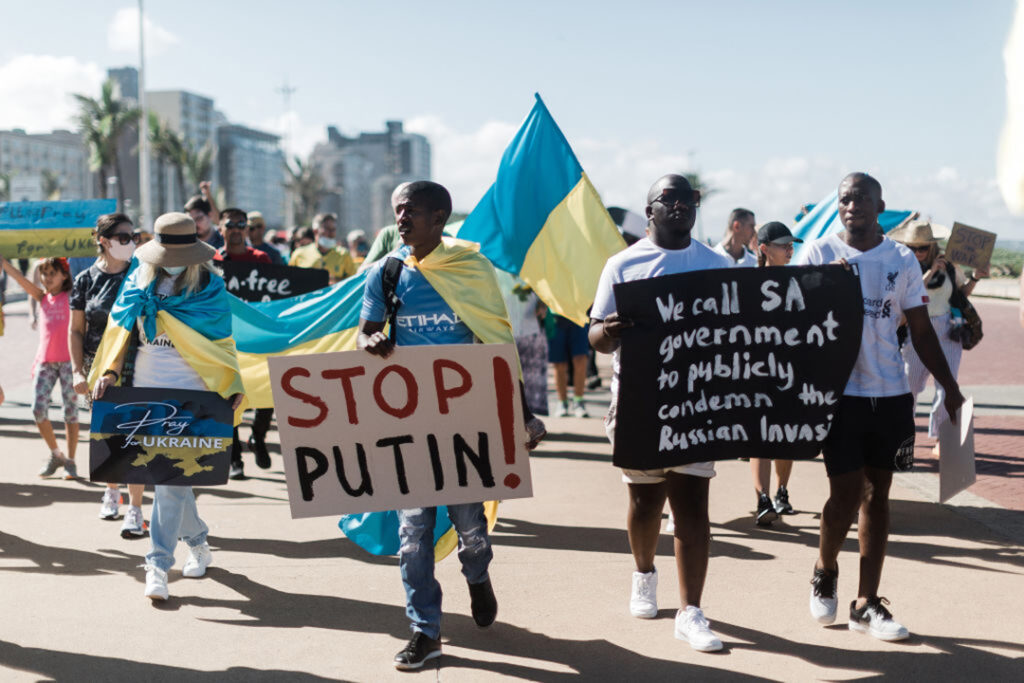ADF STAFF
One day after the Russian military invaded Ukraine, dozens of people protested outside the Russian embassy in Cape Town, South Africa.
With the blue and yellow flag of her country draped across her body, Dzvinka Kachur joined in chants of “Stop War, Stop Putin” and addressed the media as spokesperson for the Ukrainian Association of South Africa.
Her voice cracked with emotion as she called for an end to the Russian aggression.
Kachur, a researcher at the Centre for Sustainability Transitions at South Africa’s Stellenbosch University, told ADF that Russia’s invasion and the reasons it used to justify the attack should concern all African countries.
“I think the African continent will be highly affected by this Russian-Ukrainian conflict,” she said. “It will definitely result in more militarization. It will increase petrol prices. There will be food shortages. And military budgets around the world will go up, which would compromise spending on economic development and social development that is so important to Africa.
“It’s absolutely devastating to see how much resources are being wasted at the moment in the Russian war with Ukraine. A significant amount of humanitarian and developmental aid will be redirected away from African countries to Ukraine. So, I think it’s in African countries’ interest to see the end of this conflict as soon as possible.”
Experts worry that Russia’s use of military aggression to try to redraw Ukrainian borders could set a dangerous precedent in Africa, where borders cross ethnic and cultural lines.
The day before the invasion, Kenya’s ambassador to the United Nations delivered a powerful speech condemning the “trend in the last few decades of powerful states, including members of this Security Council, breaching international law with little regard.”
Ambassador Martin Kimani said Russia’s military aggression conjured memories of Africa’s colonial history.
“Kenya and almost every African country was birthed by the ending of empire,” he said during an emergency meeting of the U.N. Security Council. “At independence, had we chosen to pursue states on the basis of ethnic, racial or religious homogeneity, we would still be waging bloody wars these many decades later.
“We must complete our recovery from the embers of dead empires in a way that does not plunge us back into new forms of domination and oppression. We rejected irredentism and expansionism on any basis, including racial, ethnic, religious or cultural factors. We reject it again today.”
A week later the U.N. declared Russia was in violation of the U.N. charter in a vote that saw 17 African nations abstain.
A host of criticism followed.
Continuing to do business with Russia, which supplies military equipment to African countries and has deployed mercenaries to the continent, rewards and enables military aggression in the world, critics said.
“By not openly condemning Russia, governments are contributing to the violation of international law, killing of civilians and more humanitarian crisis,” researcher Kachur said.
Kachur urged South Africa, which abstained from the vote, to look to its own history and stand with people being oppressed.
“It is absolutely immoral not to condemn the Russian invasion,” Kachur said. “It goes against the South African constitution and the spirit of the anti-apartheid movement.”
The U.S. Embassy in Pretoria on March 3 called for South Africa to take a stronger stance against Russia’s invasion.
In a news briefing, U.S. Assistant Secretary of State for African Affairs Mary Catherine Phee said the COVID-19 pandemic has shown how a crisis in one area can impact the rest of the world.
“We are a globalized world, and this invasion affects all of us,” she said. “Let’s be clear about what we are looking at — we are looking at an unprovoked attack by Russia against Ukraine, it’s a war against democracy, and this could happen to any country. Calling it out now ensures that it does not happen in another region.”
In a letter to the U.N. General Assembly, South African Ambassador Mathu Joyini called for “diplomacy and dialogue,” but did not specifically condemn Russian aggression.
“We urge all parties to approach the situation in a spirit of compromise, with all sides upholding human rights, abiding by their obligations under international law and international humanitarian law,” she wrote.

